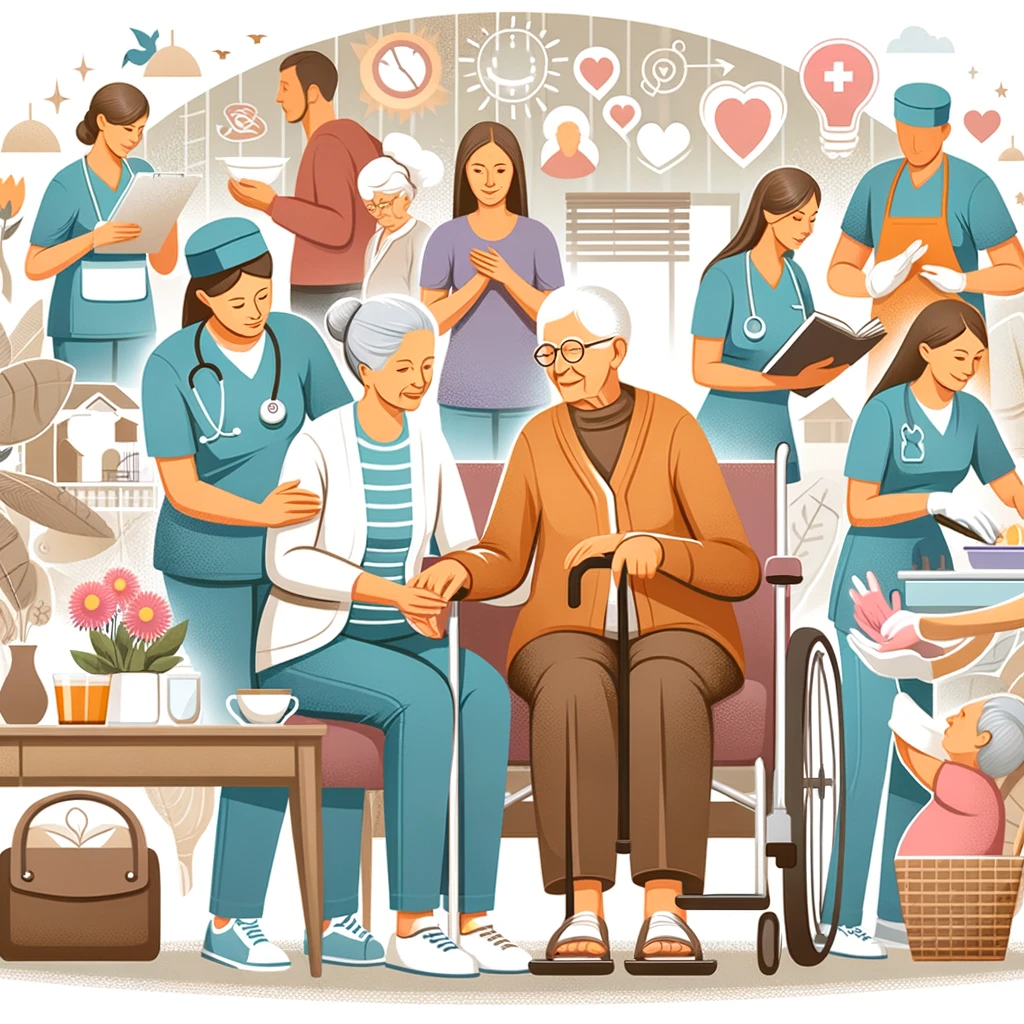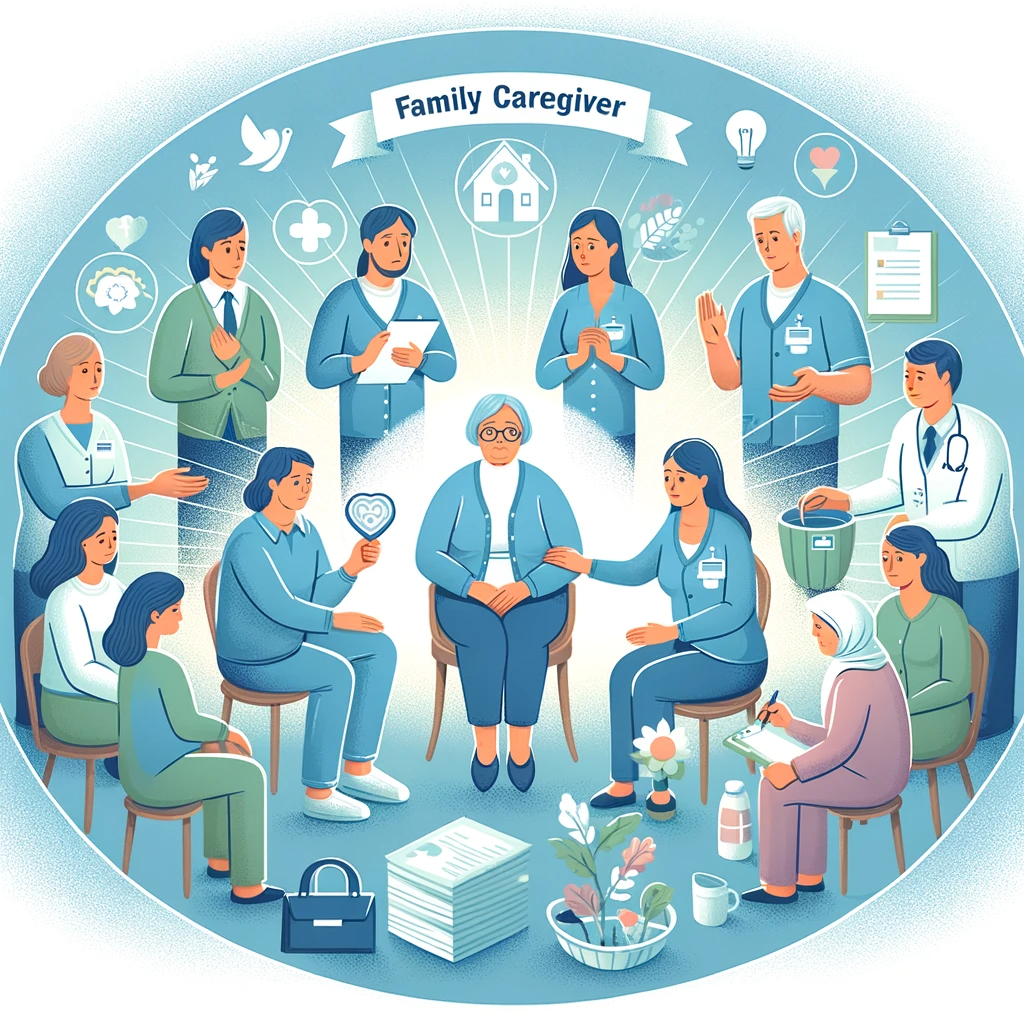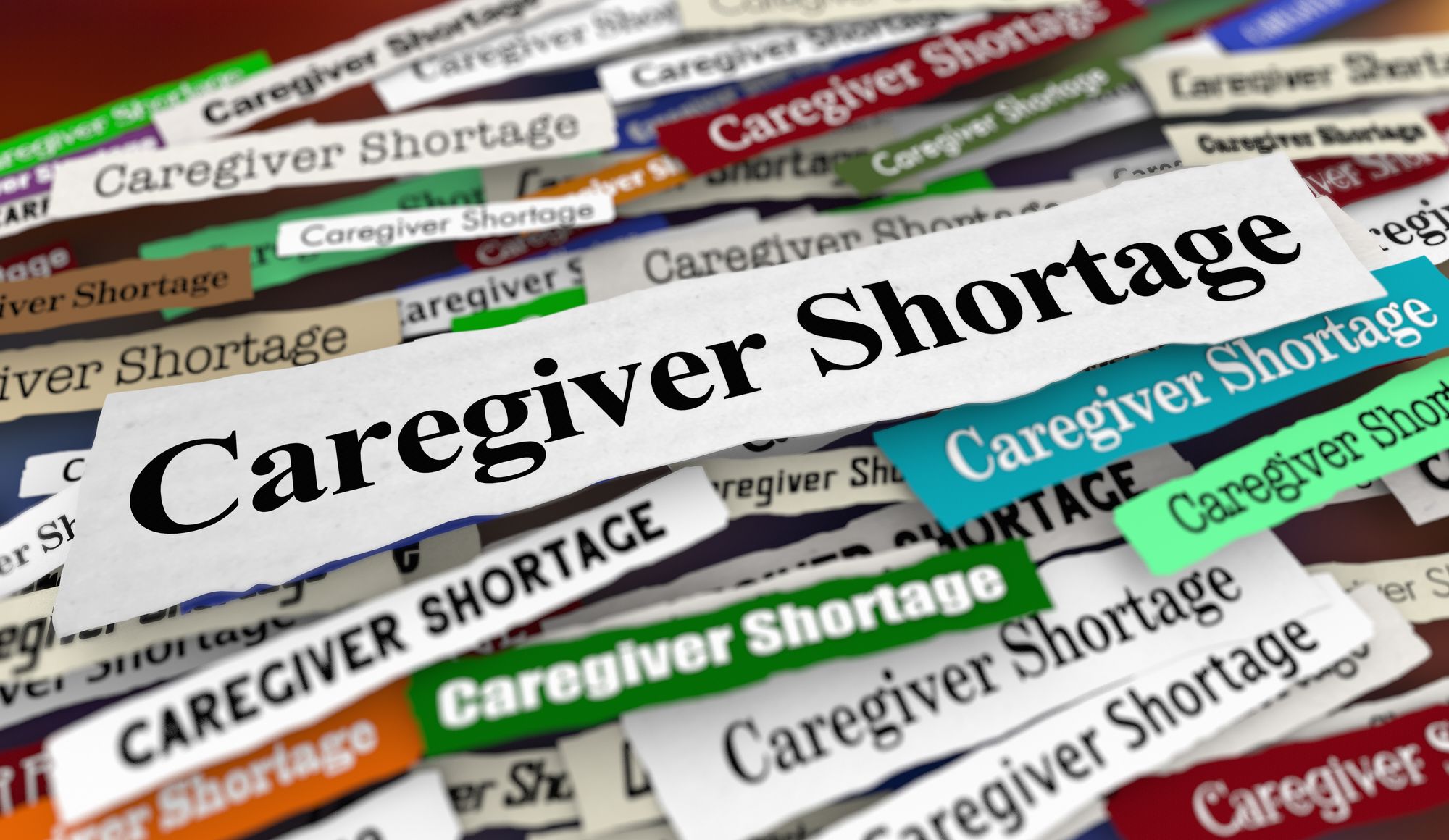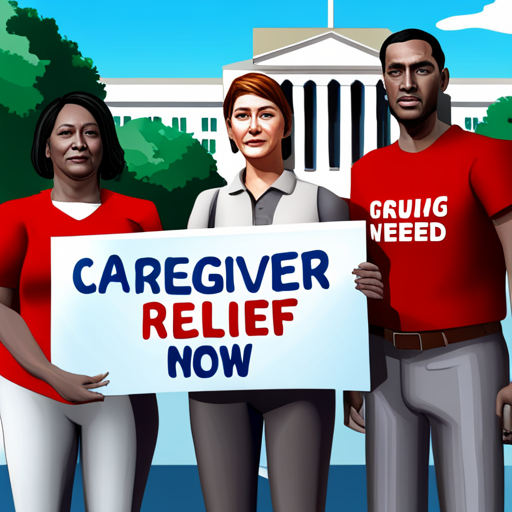Empowering Family Caregivers: Navigating Challenges with Innovative Solutions and Support Systems
Family caregivers face emotional, physical, and financial challenges daily. Empowerment comes through innovative tools, support systems, and community resources that offer relief, guidance, and strength throughout the caregiving journey.

Overview of Family Caregiving
Family caregiving, a role undertaken by many family members worldwide. As of the most recent data, there are at least 53 million people in the United States who are family caregivers. This number includes 5.5 million individuals who are caring for wounded, ill, and injured service members and veterans.
Additionally, the number of unpaid family caregivers in the U.S. increased by 9.5 million between 2015 and 2020, rising from 43.5 million to more than 53 million, reflecting a consistent increase in caregivers over time. Caregiver duties encompass essential tasks and responsibilities involved in providing care, such as ensuring proper nutrition, hygiene care, medical monitoring, and meal preparation, while also adapting care plans as the needs of the elderly change. This involves providing care and support to aging parents, relatives with disabilities, or loved ones with chronic conditions like Alzheimer’s disease.
This crucial role often falls on family caregivers without formal training, making the caregiving journey uniquely challenging. From managing daily living tasks to addressing complex healthcare needs, family caregivers become the unsung heroes in the lives of care recipients.
Importance of Addressing Caregiver Challenges
The role of a family caregiver, while rewarding, comes with its set of hurdles. Caregivers often act as advocates, navigating complex health care systems and ensuring care recipients access essential health services through communication with various health care providers. Caregivers face emotional and physical stress, often leading to caregiver burnout, a state where the caregiver’s own health and well-being are at risk. Emotional stress, coupled with the physical demands of caregiving tasks, can lead to serious health concerns, including mental health issues like clinical depression. Moreover, the financial strain of caregiving, where caregivers may have to use their own money or reduce work hours, adds to the burden. Addressing these challenges is crucial not only for the health and well-being of the caregivers but also for the quality of care provided to care recipients.

Introduction to the Proposed Solutions: Care Team Partner Support Groups and Family Caregiver Contracts
To alleviate the full caregiver burden, innovative solutions are necessary. One such solution is the formation of care team partner support groups. These groups bring together family caregivers, trained caregivers, healthcare providers, and other family members to share caregiving responsibilities, offer emotional support, and provide practical assistance. This collective approach helps in distributing the caregiving duties, ensuring that the caregiver's own needs are not sidelined.
Another critical solution is the establishment of family caregiver contracts or personal care contracts. These contracts serve as formal agreements among family members, delineating the caregiving responsibilities, financial arrangements, and other necessary boundaries. Such contracts help in setting clear expectations, thus preventing misunderstandings and reducing the emotional and physical stress associated with caregiving. By creating these contracts, caregivers can practice self-care, manage their time and energy more effectively, and maintain their emotional and physical health.
By adopting these innovative solutions, family caregivers can significantly mitigate the common challenges of caregiving, ensuring both their well-being and that of their loved ones.
Understanding the Family Caregiver Role
Definition and Importance of Family Caregivers
Family caregivers are individuals who provide care and support to their family members, often an aging parent or a relative with a chronic condition such as Alzheimer’s disease or other cognitive impairments. Understanding the duties and responsibilities of a senior caregiver is crucial, as it enhances their ability to serve the elderly population effectively. These caregivers play a pivotal role in the health and well-being of their care recipients, taking on responsibilities that range from managing daily living activities to handling complex medical tasks. The importance of family caregivers cannot be overstated; they are the backbone of in-home care, allowing many older adults and individuals with disabilities to live in the comfort of their homes.

The Evolving Role of Family Members in Caregiving
The role of the family member in caregiving has significantly evolved over the years, encompassing both caregiving duties and decision-making processes. Traditionally, caregiving was seen as a responsibility primarily undertaken by female family members. However, this scenario is changing. Now, family caregiving encompasses a diverse group of individuals, including spouses, adult children, siblings, and even close friends. The caregiver role is no longer limited to direct physical care but also includes managing financial matters, navigating healthcare systems, and providing emotional support.
As medical advancements prolong life expectancy, many family caregivers are finding themselves in the ‘sandwich generation,’ caring for both their children and aging parents simultaneously. This dual role adds complexity to their caregiving responsibilities, as they must balance the needs of different generations with their own life and career.
Common Challenges Faced by Family Caregivers
Family caregivers encounter a myriad of challenges, affecting their physical, emotional, and financial well-being:
Emotional and Physical Stress:
Caregiving is an emotionally taxing role. Many caregivers report feelings of anxiety, depression, and isolation, stemming from the constant worry and the emotional toll of caring for a loved one. The physical demands of caregiving, such as lifting and assisting with mobility, can also lead to physical stress and health problems for the caregiver.
Financial Strain:
The financial impact of caregiving is significant. Caregivers often face financial burden due to reduced work hours or having to leave their jobs entirely to provide care. The out-of-pocket expenses, including medical bills and caregiving supplies, further contribute to this strain.
Healthcare Navigation and Caregiving Tasks:
Navigating the healthcare system and managing medical tasks can be overwhelming, especially for non-trained caregivers. Maintaining communication with health professionals is crucial to monitor clinical symptoms and manage medications effectively. From medication management to coordinating with healthcare providers, caregivers are often thrust into complex medical roles without adequate training or support.

Balancing Caregiving with Personal Life:
Caregivers frequently struggle with finding time for self-care and maintaining their own physical and mental health. Ensuring that elderly individuals receive balanced and nutritious meals is a crucial part of caregiving, as proper nutrition supports their overall well-being. Balancing caregiving duties with personal responsibilities, work schedules, and social life can lead to burnout and a sense of losing one’s own identity.
Lack of Formal Support and Training:
Unlike professional caregivers, family caregivers often lack formal training and support. This gap can lead to uncertainty and increased stress, as caregivers navigate complex caregiving tasks without proper guidance.
Sleep Deprivation and Health Risks:
Many family caregivers experience sleep deprivation due to the round-the-clock nature of caregiving, particularly in cases of dementia or severe illness. This lack of sleep not only affects their own health but can also impact the quality of care they provide.
Emotional Rollercoaster:
The emotional journey of caregiving is complex. Caregivers may experience feelings of guilt, anger, sadness, and joy, often cycling through these emotions rapidly. Managing their own emotional health while providing emotional support to their care recipient is a challenging balancing act.
Changing Family Dynamics:
Caregiving can alter family dynamics, leading to tensions and conflicts. Issues around the distribution of caregiving duties among other family members and decision-making can create strain within the family unit.
Caregiver Burnout:
Perhaps the most significant challenge is caregiver burnout – a state of physical, emotional, and mental exhaustion. Burnout can lead to a decrease in the quality of care provided and negatively impact the caregiver's own health and well-being.
Understanding these challenges is crucial for providing adequate support and resources to family caregivers. By acknowledging the complexities of the caregiving role, society can better assist these essential yet often invisible heroes in their critical caregiving journey.
The Burden of Caregiving: Advocating for Change Through the Family and Direct Care Worker Petition
The role of a family caregiver, integral to the fabric of our healthcare system, often comes with significant emotional, physical, and financial challenges. These issues underscore the critical need for comprehensive support, which is the driving force behind the Family and Direct Care Worker Petition. This initiative aims to address the myriad of challenges faced by family caregivers and direct care workers, advocating for meaningful change and recognition at the highest levels, including the White House Conference on Aging in 2025.
Emotional and Physical Stress in Caregiving
Family caregivers frequently experience high levels of emotional and physical stress. The constant demands of caregiving, coupled with the emotional weight of caring for a loved one, can lead to anxiety, depression, and physical health problems. Caregivers of individuals with Alzheimer's or dementia face unique challenges, as they navigate the complexities of these progressive conditions. The physical demands, such as assisting with daily living activities, further exacerbate this stress, often leading to burnout.

The Full Caregiver Burden
The burden of caregiving extends to financial challenges. Many caregivers face reduced income due to caregiving responsibilities and bear additional out-of-pocket expenses. This financial strain is a significant concern, with caregivers often sacrificing their savings or accruing debt to manage caregiving expenses. The lack of affordable respite care services and support exacerbates this situation, underlining the need for comprehensive policies and assistance.
The Family and Direct Care Worker Petition: A Call to Action
Recognizing these challenges, the Family and Direct Care Worker Petition was created as a call to action. This petition seeks to:
Increase Awareness:
Elevate the public understanding of the challenges faced by family caregivers and direct care workers.
Advocate for Policy Change:
Push for policies that provide financial support, including tax credits and paid family leave for caregivers.
Promote Access to Respite Care and Support Services:
Advocate for more accessible and affordable respite care services to alleviate the physical and emotional toll on caregivers. Create a national volunteer movement to help support the family caregiver. This movement would provide education to the public on how to provide practical assistance to those providing support for others. Creating a Care Team Partner Support Group is a first step to provide ongoing practical support and respite care for the family caregiver.
Enhance Training and Resources:
Ensure caregivers have access to training and resources to manage caregiving tasks effectively.
Support Mental Health:
Advocate for better mental health support and resources for caregivers, recognizing the emotional toll of caregiving.
Gain Recognition at the White House Conference on Aging:
Aim to bring these issues to the forefront at the White House Conference on Aging in 2025, seeking to influence national policies and programs.

Driving Change for Family Caregivers and Direct Care Workers
The goal of this petition is to garner public attention and drive change that will significantly improve the lives of family caregivers and direct care workers. By addressing these critical issues, the petition aims to create a more sustainable and supportive environment for those at the forefront of providing care. The emphasis is on acknowledging the invaluable contribution of caregivers and ensuring that their needs are met, both for their well-being and for the enhanced care of their recipients.
The Family and Direct Care Worker Petition is not just a call for help; it's a movement towards a future where caregiving is recognized, supported, and valued. By rallying public support and advocating for policy changes, we can work towards a society that fully appreciates the vital role of caregivers and provides them with the support they deserve.
Health Impacts on Caregivers: Addressing Mental and Physical Concerns
Mental and Physical Health Concerns for Caregivers
The role of family caregivers, while noble and essential, often comes with significant health implications. Many caregivers, absorbed in their caregiving responsibilities, face a range of mental and physical health concerns. Mentally, the role can induce high levels of stress, anxiety, and emotional strain, particularly for those caring for loved ones with chronic conditions like Alzheimer's disease or other forms of cognitive impairment. This constant mental burden can escalate into more severe conditions, such as clinical depression, significantly impacting the caregiver's emotional health and overall quality of life.
Physically, the demands of caregiving - from assisting with daily living activities to managing the physical needs of care recipients - can be strenuous. Many caregivers report experiencing physical stress, leading to chronic fatigue, sleep deprivation, and various health problems. This situation is further complicated for caregivers who are part of the aging population themselves, as they face their own health challenges while caring for others.
Risks of Caregiver Burnout and Clinical Depression
One of the most severe risks faced by caregivers is burnout - a state of physical, emotional, and mental exhaustion. Caregiver burnout often results from the cumulative pressures of caregiving tasks and emotional stress. Symptoms may include feelings of detachment, reduced performance in caregiving duties, and a sense of hopelessness. Left unaddressed, burnout can lead to clinical depression, a serious mental health condition that requires professional intervention. This underscores the critical need for early recognition and management of these risks to prevent long-term health consequences.

Importance of Self-Care and Maintaining Personal Well-being
Amidst the challenges, self-care emerges as a crucial element for caregivers. Engaging in self-care practices is not a luxury but a necessity for caregivers to maintain their own health and well-being. This can include simple activities like regular exercise, adequate sleep, healthy eating, and making time for hobbies or interests that bring joy and relaxation.
Furthermore, seeking support through caregiver support groups, counseling services, building a care team partner support group or connecting with other family members for emotional and practical assistance can be invaluable. Respite care services also play a vital role, providing caregivers with necessary breaks and time to focus on their own needs.
Healthcare providers and medical professionals can offer guidance and resources to help caregivers manage both their physical and mental health. Establishing a routine for regular health check-ups and being open about the challenges faced can lead to better support and care strategies.
Acknowledging and addressing the mental and physical health impacts on caregivers is crucial. By prioritizing self-care and seeking appropriate support, caregivers can safeguard their well-being, ultimately leading to better care for their loved ones and a more balanced, healthier life for themselves.
Navigating Caregiving Responsibilities: Achieving Balance and Support
Balancing Caregiving Duties with Personal Life
Navigating the responsibilities of being a family caregiver requires a delicate balance between caregiving duties and personal life. The most common caregiver duties encountered in the context of providing in-home senior care include assisting with daily activities, managing medications, and providing emotional support. For many caregivers, the demands of providing care for a loved one, especially those with chronic conditions like Alzheimer’s disease or other forms of dementia, can become all-consuming. This often leads to caregivers neglecting their own needs, interests, and social connections. The challenge lies in maintaining a sense of self and personal well-being while effectively managing caregiving tasks.
Balancing these aspects involves establishing boundaries, prioritizing tasks, and recognizing the importance of self-care. Caregivers need to acknowledge that taking care of their own health and well-being is not selfish, but essential for providing quality care. This balance can be achieved through effective time management, delegating responsibilities where possible, and ensuring personal time for relaxation and social activities.
Managing Time, Energy, and Emotional Stress
Effective time management is crucial for caregivers to juggle the myriad of tasks that caregiving entails, along with their personal life. Creating a structured routine can help in efficiently managing caregiving responsibilities, work commitments, and personal activities. It's also vital for caregivers to recognize their limits and conserve their energy by not overextending themselves.
Managing emotional stress is another critical aspect of caregiving. Caregiving can be a rollercoaster of emotions, from love and compassion to frustration and guilt. Caregivers often face emotional and physical stress, leading to burnout. It's essential for caregivers to find healthy ways to cope with stress, such as engaging in relaxation techniques, exercise, or seeking emotional support from friends, family, or support groups.

The Need for Respite Care and Professional Support
Respite care is an invaluable service for family caregivers, providing them with much-needed breaks from their caregiving duties. This can include temporary care services offered by trained caregivers or healthcare professionals, allowing family caregivers to take time for themselves, whether it's a few hours or a few days. Respite care not only helps in reducing the stress and physical demands of caregiving but also provides care recipients with the opportunity to interact with others, which can be beneficial for their emotional and social well-being.
Professional support can also come in the form of healthcare providers, counselors, and caregiving support services. These resources can offer guidance, medical assistance, and emotional support to help caregivers navigate the complexities of caregiving.
Creating a Care Team Partner Support Group
A significant way to alleviate the pressures of caregiving is by creating a care team partner support group. This group can consist of other family members, friends, healthcare professionals, and community members who come together to share the caregiving responsibilities. Such a support system provides practical assistance in caregiving tasks and emotional support, helping to distribute the workload and reduce the sense of isolation that many caregivers experience.
A care team partner support group can also facilitate a more balanced life for the caregiver. With the support group sharing responsibilities, caregivers can find more time for themselves, pursue their interests, and maintain social connections. This collaborative approach not only enhances the quality of care provided to the care recipient but also significantly improves the quality of life for the caregiver.
Navigating caregiving responsibilities effectively requires a combination of personal time management, emotional stress management, utilization of respite care, professional support, and the formation of a care team partner support group. By implementing these strategies, caregivers can find a healthier balance between their caregiving duties and personal life, leading to a more sustainable and fulfilling caregiving journey.

The Pros and Cons of Creating a Care Team Partner Support Group
The concept of a care team partner support group has emerged as an innovative solution to address the challenges faced by family caregivers. These groups involve a collective of individuals - family members, friends, healthcare professionals, and community members - who work together to share caregiving responsibilities. While the benefits of such a group are substantial, it's important to consider both the advantages and potential drawbacks.
Pros of Creating a Care Team Partner Support Group
Shared Responsibilities:
One of the most significant benefits is the distribution of caregiving tasks among group members. This reduces the physical and emotional burden on any single caregiver, making the caregiving journey more manageable and sustainable.
Emotional Support and Companionship:
Caregiving can be isolating. Having a support group provides emotional and moral support, reducing feelings of loneliness and stress. Group members can offer each other encouragement and understanding, creating a network of companionship.
Diverse Skills and Perspectives:
Members of a care team bring different skills and perspectives. This diversity can lead to more comprehensive care for the recipient, as each member contributes their unique strengths, whether it's medical knowledge, emotional support, or practical skills like meal preparation.
Improved Quality of Life for Caregiver and Care Recipient:
With shared responsibilities, caregivers have more time to focus on their own needs and well-being, leading to a better balance between caregiving and personal life. Additionally, care recipients benefit from interacting with multiple caregivers, which can enhance their social engagement and overall care.
Learning and Growth:
Being part of a care team can be an educational experience. Caregivers can learn from each other, gaining new insights and skills in caregiving, which can enhance the care provided.
Cons of Creating a Care Team Partner Support Group
Coordination and Communication Challenges:
Managing and coordinating a group of people with different schedules and ideas can be challenging. Effective communication is crucial and can sometimes be difficult to maintain.
Potential Conflicts:
Differences in opinions and approaches to caregiving can lead to conflicts within the group. Managing these conflicts requires diplomacy, patience, and sometimes, mediation skills.
Inconsistency in Care:
With multiple people involved, there can be inconsistencies in the care provided. It's essential to establish clear guidelines and routines to ensure consistent care for the recipient.
Privacy Concerns:
Having several people involved in caregiving might raise concerns about the privacy of the care recipient, especially regarding their medical and personal information.
Enhancing Caregiving Skills through Education
To address these challenges and maximize the benefits of a care team partner support group, it's recommended that caregivers and potential care team members consider educational resources. One such resource is the “How to Become a Patient Care Advocate” course. This course can provide valuable insights into effective caregiving, including aspects like patient rights, healthcare navigation, and effective communication.
This education can empower caregivers and care team members with the knowledge and skills needed to provide compassionate and effective care. It also helps in understanding the intricacies of healthcare systems, patient advocacy, and the importance of maintaining the dignity and independence of care recipients.
While the creation of a care team partner support group comes with its set of challenges, the benefits it offers in terms of shared responsibility, emotional support, and improved care quality make it a valuable strategy in caregiving. Coupled with educational resources like the “How to Become a Patient Care Advocate” course, caregivers can enhance their skills and knowledge, leading to a more positive and impactful caregiving experience.
Caregiver Relief has Partnered with Care Tree Online Care Management for Family Caregivers
Our Care Management is a digital platform designed to streamline and simplify the caregiving process for family caregivers. This innovative tool offers a range of features that can significantly enhance the caregiving experience. Understanding the benefits of our online care management platform can help family caregivers make informed decisions about integrating this technology into their caregiving routine.
Centralized Information Sharing
One of the most significant benefits of our online platform is its ability to centralize important information. Caregivers can store and access critical data such as medical records, medication schedules, and care plans in one secure place. This centralized approach ensures that everyone involved in the care process, including other family members and healthcare professionals, has up-to-date information, leading to more coordinated and effective care.
Enhanced Communication
This online care management platform facilitates improved communication among everyone involved in the care recipient's circle. It allows for real-time updates, ensuring that any changes in the care plan or the recipient's condition are promptly communicated. This feature is especially beneficial for caregivers who are part of a care team or who need to coordinate with the care team partners and medical professionals.
Schedule Management
Managing appointments and caregiving tasks can be overwhelming. Our online care management platform offers scheduling tools that help caregivers organize and keep track of medical appointments, medication timings, and other important events. This helps in ensuring that the care recipient does not miss any critical appointments or medications.
Documentation and Record Keeping
The platform provides robust documentation and record-keeping capabilities. Caregivers can easily document the care recipient's progress, any changes in their condition, and keep a record of all interactions with healthcare providers. This documentation is crucial for monitoring the care recipient's health over time and for sharing accurate information with medical professionals.
Accessibility and Mobility
With our online platform, caregivers can access information and manage caregiving tasks from anywhere, as long as they have an internet connection. This mobility is particularly beneficial for caregivers who have to balance caregiving with other responsibilities, as they can stay informed and make decisions on the go.
Reducing Caregiver Burden
By streamlining caregiving tasks, our online care management platform can significantly reduce the burden on caregivers. It simplifies many aspects of caregiving that are typically time-consuming and stressful, such as coordinating care among multiple parties, managing medical information, and keeping track of appointments and medications.
Security and Privacy
Our online care management platform is designed with security and privacy in mind. It ensures that sensitive health information is stored securely and shared only with authorized individuals. This is crucial in maintaining the confidentiality and privacy of the care recipient's medical information.
Empowering Caregivers
Finally, our online care management platforms empowers caregivers by providing them with the tools and resources they need to provide effective care. With better organization, communication, and access to information, caregivers can feel more confident and less stressed, leading to better outcomes for both the caregiver and the care recipient.
Our online care management platform offers a comprehensive solution to many of the challenges faced by family caregivers. By providing tools for better communication, organization, and information management, it can greatly enhance the efficiency and effectiveness of caregiving, ultimately leading to improved care for recipients and a more manageable experience for caregivers.

The Family Caregiver Contract: Setting Boundaries and Expectations
The concept of a family caregiver contract, also known as a personal care agreement, is becoming increasingly important in the realm of family caregiving. Understanding the caregiver job description is crucial for effectively serving the elderly, as it encompasses a range of duties from providing companionship to delivering complex medical care. This formal agreement between a family caregiver and their care recipient, or other family members, outlines the responsibilities, expectations, and compensation (if any) for caregiving services. The utilization of such contracts can significantly improve the caregiving experience for both the caregiver and the care recipient.
Advantages of Creating a Family Caregiver/Personal Care Contract
Clarification of Roles and Responsibilities:
A caregiver contract clearly defines the scope of caregiving services, including specific tasks and schedules. This clarity helps prevent misunderstandings and ensures that all parties have a shared understanding of what is expected.
Financial Transparency:
If the caregiving arrangement involves financial compensation, a contract provides transparency regarding payment terms. This can include compensation for caregiving tasks, reimbursement for out-of-pocket expenses, or management of financial matters related to the care recipient.
Legal Protection:
A formal contract can serve as a legal document, providing protection for both the caregiver and the care recipient. It can be particularly beneficial in proving the legitimacy of financial arrangements, which might be important for tax purposes or when assessing eligibility for public benefits.
Recognition of the Caregiver's Role:
The contract acknowledges the significant role of the caregiver, giving them recognition and legitimacy. This can be crucial in situations where other family members may not fully appreciate the extent of the caregiver's responsibilities.
Establishing Boundaries and Clarifying Roles
Family caregiver contracts help in setting clear boundaries, which is essential for maintaining a healthy caregiver-care recipient relationship. By outlining specific caregiving duties, the contract prevents the caregiver from being overwhelmed with unrealistic expectations or tasks outside their capacity. It also ensures that the care recipient's needs are met without ambiguity about who is responsible for various aspects of care.
Impact on Family Dynamics and Reducing Caregiver Burden
The use of a caregiver contract can have a significant positive impact on family dynamics:
Preventing Family Conflicts:
By clearly defining caregiving roles and financial arrangements, the contract can prevent potential conflicts among family members. It helps in ensuring that caregiving is a fair and transparent arrangement, understood and agreed upon by all involved parties.
Supporting the Caregiver's Well-being:
A well-defined contract supports the caregiver's well-being by establishing clear expectations and limitations. This helps in preventing caregiver burnout and ensures that the caregiver's own health and personal life are not neglected.
Ensuring Quality of Care:
The contract indirectly contributes to the quality of care received by the care recipient. When a caregiver is not overburdened and their role is clearly defined, they are more likely to provide effective and compassionate care.
Facilitating Open Communication:
The process of creating a contract encourages open communication among family members, fostering an environment of mutual respect and understanding. It provides a platform for discussing and addressing caregiving challenges and expectations.
A family caregiver contract is a valuable tool in the caregiving journey. It provides a framework for clear communication, fair compensation, and mutual respect, thereby enhancing the caregiving experience. It not only helps in reducing the caregiver's burden but also ensures that the care recipient receives consistent and quality care. For those navigating the complexities of caregiving, drafting a caregiver contract can be a step towards a more structured, transparent, and harmonious caregiving arrangement.
Practical Solutions for Caregivers: Strategies for Effective Caregiving
Caregiving, while rewarding, can be a challenging journey, requiring a balance of compassion, patience, and practical skills. Effective caregiving involves managing time, practicing self-care, establishing boundaries, and utilizing various support systems. This article explores practical solutions that can aid caregivers in their responsibilities, ensuring both their well-being and the optimal care of their loved ones.
Tips for Effective Caregiving
Time Management:
Effective time management is crucial for caregivers. Prioritizing tasks, creating a structured daily routine, and making to-do lists can help manage the multitude of caregiving responsibilities. Utilizing digital tools or apps for scheduling can also aid in keeping track of appointments, medication times, and other important events.
Self-Care:
Caregivers must prioritize their own health and well-being. Regular exercise, a balanced diet, adequate sleep, and time for relaxation are essential. Self-care also means recognizing when to take a break and seeking emotional support, be it from friends, family, or support groups.
Establishing Boundaries:
Setting clear boundaries is key to preventing caregiver burnout. This includes learning to say no when necessary, delegating tasks, and maintaining personal time for hobbies and social activities. Understanding one's limits and communicating them to others helps maintain a healthy balance between caregiving and personal life.
Utilizing Respite Care Services and Trained Caregivers
Respite Care Services:
Respite care provides temporary relief to primary caregivers, allowing them to take necessary breaks. These services can range from a few hours to several days and can be provided at home or in a specialized facility. Utilizing respite care helps prevent caregiver fatigue and supports overall well-being.
Trained Caregivers and Care Team Partners:
Incorporating trained caregivers or forming a care team partner group can significantly ease the caregiving load. These individuals can share caregiving duties, bringing in their expertise and providing quality care to the care recipient. It also offers an opportunity for caregivers to learn new skills and caregiving techniques.
Engaging with Healthcare Providers and Medical Professionals
Regular Communication with Healthcare Providers:
Engaging regularly with healthcare providers ensures that caregivers are up-to-date with the care recipient's health status and any medical changes. This collaboration can provide valuable guidance on managing health conditions and making informed decisions about care.
Building a Relationship with Medical Professionals:
Establishing a strong relationship with doctors, nurses, and other medical professionals can be immensely beneficial. They can offer advice, emotional support, and resources that can help caregivers in their role.
Leveraging Care Team Partners:
Care team partners, including medical professionals, can collaborate to provide comprehensive care. This team approach ensures that all aspects of the care recipient's health and well-being are addressed, from medical needs to emotional and social support.
Practical solutions like effective time management, self-care, and establishing boundaries play a vital role in caregiving. Utilizing respite care services and engaging with trained caregivers and medical professionals can further enhance the caregiving experience. These strategies not only ensure the well-being of the caregiver but also contribute to the quality of care provided to the care recipient. By adopting these practices, caregivers can navigate their roles more effectively and sustainably.

Advocacy and Community Support for Caregivers
Role of National Alliances and Local Support in Empowering Caregivers
National alliances and local support networks play a critical role in empowering family caregivers. These organizations often provide a wealth of resources, including educational materials, access to support groups, and guidance on navigating the complexities of caregiving. National alliances, such as the National Alliance for Caregiving, advocate for policy changes that benefit caregivers, raising awareness about their needs at both the national and local levels. Local support networks, on the other hand, offer more personalized assistance and can connect caregivers with local resources, such as respite care services, trained caregivers, and healthcare providers.
The Importance of Community and Close Friends in the Caregiving Journey
The support of the community and close friends is invaluable in the caregiving journey. Community involvement can alleviate the isolation often felt by caregivers, providing emotional support and practical help. Community members and friends can assist with caregiving tasks, offer companionship to the care recipient, and provide a listening ear or a shoulder to lean on for the caregiver. This network of support can significantly reduce the emotional and physical stress associated with caregiving, fostering a sense of belonging and community solidarity.

Overview of the Petition to Support Family Caregivers and Direct Care Workers
In response to the challenges faced by family caregivers and direct care workers, a petition has been initiated to call for more support and recognition of their efforts. This petition advocates for better policies and support systems, such as financial assistance, access to affordable respite care services, and more substantial legal protections. The goal is to bring these issues to the forefront of public and policy discussions, ensuring that caregivers receive the recognition and assistance they deserve.
Conclusion
Summarizing the Importance of Supporting Family Caregivers
Supporting family caregivers is crucial, not only for their well-being but also for the quality of care they provide to their loved ones. As caregivers face numerous challenges, including financial strain, emotional and physical stress, and legal complexities, it is imperative that they receive adequate support. This support can come in various forms, from national and local resources to the backing of community members and close friends.
Encouraging the Adoption of Care Team Partner Support Groups and Caregiver Contracts
Adopting care team partner support groups and caregiver contracts can greatly assist caregivers in managing their responsibilities. Care team partner support groups offer shared caregiving responsibilities and emotional support, lessening the burden on individual caregivers. Caregiver contracts help in setting clear expectations and boundaries, ensuring that caregiving is a fair and transparent arrangement.
Final Thoughts on Improving the Caregiving Journey
In conclusion, improving the caregiving journey requires a collective effort. By embracing the support of national alliances, local communities, and implementing practical solutions like care team partner support groups and caregiver contracts, we can create a more sustainable and supportive environment for caregivers and care recipients alike. It's time to recognize and value the selfless contributions of family caregivers and direct care workers, and work towards creating a society where their efforts are supported and appreciated.
Please sign and share the Caregiver Relief Family and Direct Care worker Petition
Share your challenges and caregiving stories here
Our Resources section can help you find the information and tools that you need. We have courses, videos, checklists, guidebooks, cheat sheets, how-to guides and more.
You can get started by clicking on the link below. We know that taking care of a loved one is hard work, but with our help you can get the support that you need.
Click here to go to Resources Section now!



